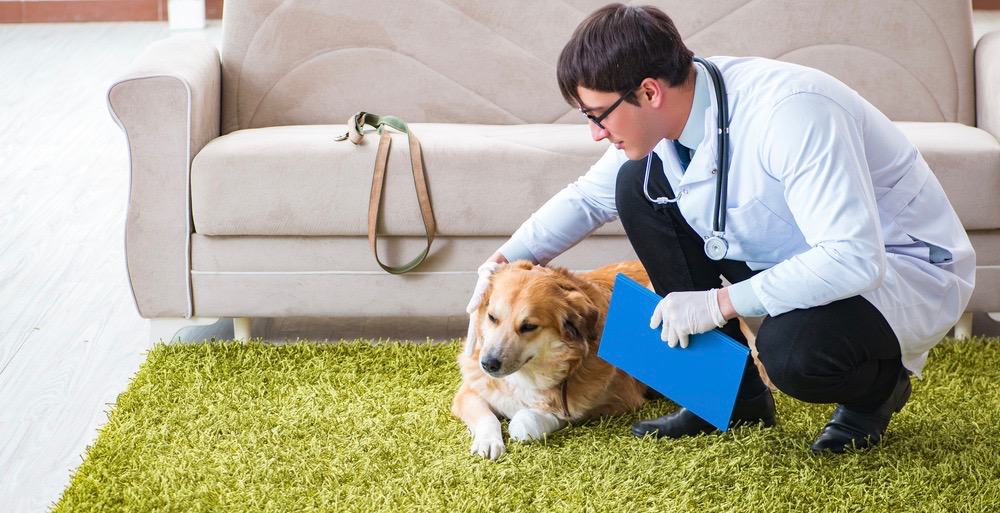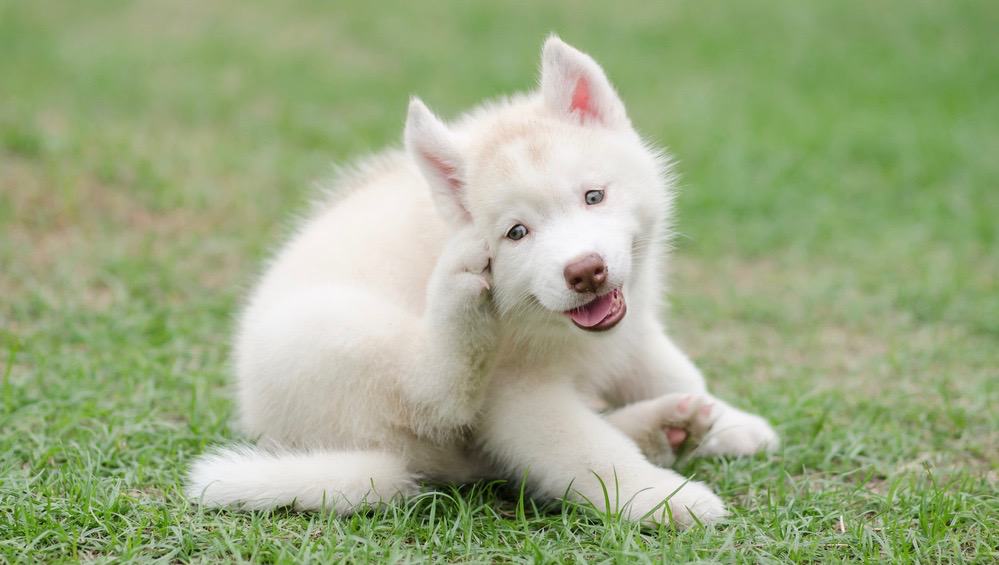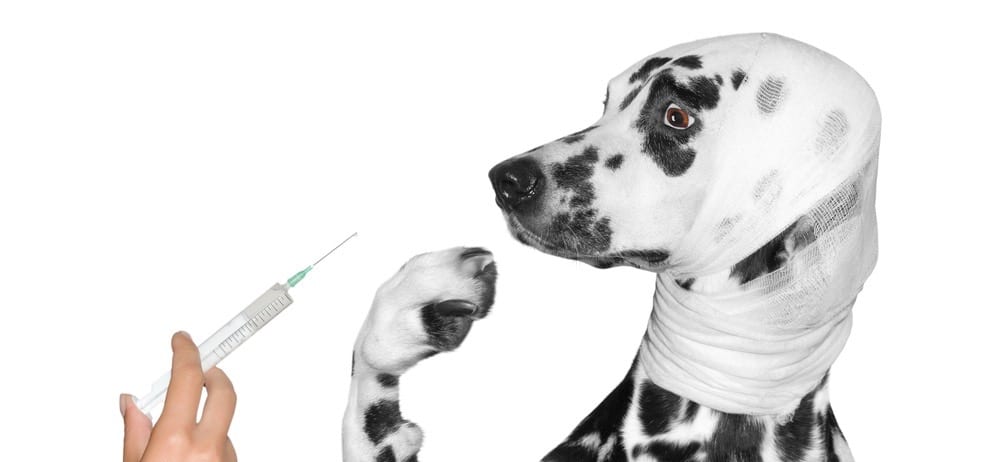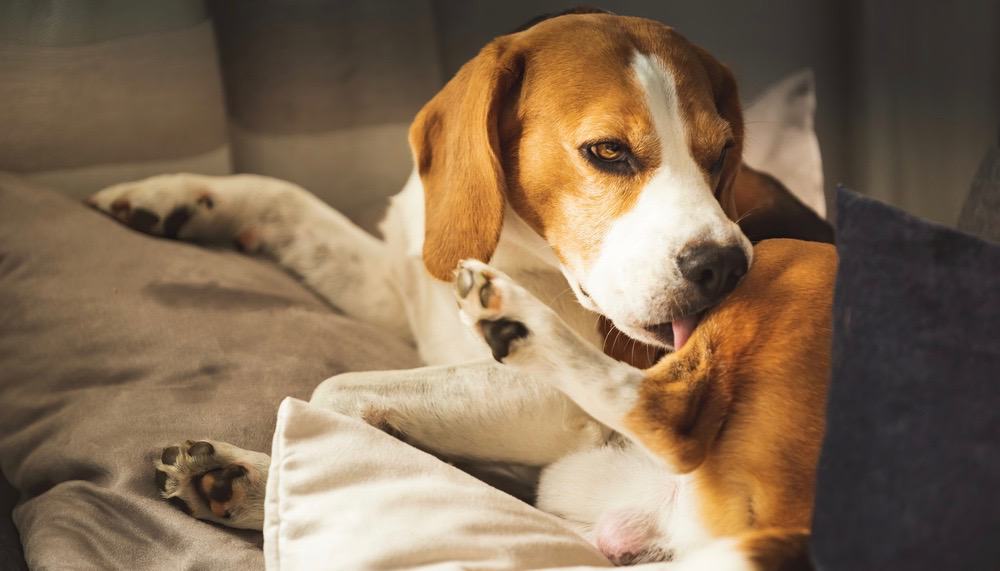My Dog Keeps Sitting Down Abruptly – Why Is My Dog Sitting Down?
‘My dog keeps sitting down abruptly’ is a phrase that you have probably used when visiting the vet.
This mostly happens when you are out for a walk and your dog suddenly sits or even lays down and refuses to move. But what can you do if your dog keeps sitting down?
Before doing anything, you need to find what is causing your dog to behave the way they do. Some dogs may be lazy, but for some, there could be something serious going on with them.
When your dog sits down abruptly during walks, there is a high chance that they are in pain and uncomfortable.
The discomfort or pain can be caused by fleas, worms, joint problems, some treatments, swollen anal glands, and other reasons.
This article will give you more information about these causes.
Reasons Why Your Dog Sits Down

Some health issues can be making your dog sit down during walks. Dogs cannot tell you what is wrong with them, and they will avoid showing any signs of pain or limping. This is their nature and not an attitude.
Since dogs are pack animals, their hierarchy is determined by health, strength, and dominance. If they are hurting, they lose their status, and in nature, they may be allowing their enemies to attack, so they hide it.
You should be patient with them because they are not trying to frustrate you but need help. The following are some of the reasons why your dog is abruptly sitting down and how you can help them:
1. Swollen Anal Glands
Your dog’s anal glands are located within the muscles around the rectum and are carriers of the scent that dogs like to sniff.
When the anal glands are properly working, they express naturally every time your dog poops and leave a scent as a signal for other dogs.
However, the anal glands can easily be infected making them abscessed if left untreated. When the glands are abscessed, they rupture through the skin and will require antibiotics, surgery, or painkillers to treat.
Swollen gland is the most common reason why your dog begins scooting to relieve the pressure or sits down abruptly.
Other signs of swollen glands include pus-filled or bloody stool, straining when trying to poop, excessive licking of the rectum, and swollen area or a bump near the rectum.
The solution to swollen anal glands is to express them yourself. This will save you on vet bills or expensive groomer, however, the process can be a bit messy and smelly.
When doing this, ensure that you are wearing gloves and have all the clean-up products with you.
The gloves should be durable, disposable, powder-free, and thin. Even though it is effective, expressing the anal glands manually should not be frequently done because it can create scar tissue and cause inflammation.

Prevention is the best way to a solution for swollen anal glands.
Feeding your dog foods high in fiber and omega 3 fatty acids as well as keeping them in a healthy weight will ensure that they are protected from anal gland issues in the future.
2. Joint and Nerve Issues
Your dog may be sitting down suddenly because they are experiencing a deeper structural issue. Nerve impingements can cause your dog to sit down involuntarily.
Nerve damage can cause a reflexive response on certain limbs depending on the part of the spine that is damaged. This causes the limbs to become weak, altering the way your dog walks.
Joint health also affects the biochemical movement of your dog. If your dog suffers from hip dysplasia or arthritis, they are not able to stand for long periods or unable to walk, making them sit down more often.
Dogs are at risk of getting arthritis, like humans, especially the older ones. When there is an insufficient buffer between the bones, your dog experiences arthritic pain.
The bones grind together when your dog walks causing swelling and pain. Your dog may not want to go for walks when they are experiencing this kind of pain, that is why they keep sitting down.
Hip dysplasia can affect your dog’s walking because it is painful. This condition is more prone in bigger dogs and those that grow quickly.
It hurts when the socket and ball joint of your dog’s hip grinds together and can wear down over time. If your dog has hip dysplasia, they will eventually get inevitable arthritis.
Nerve and joint issues should be assessed and treated by a professional. A trained vet will give your dog a full orthopedic exam to determine whether the joints, limbs, spine, and neck are functioning well.
He/she will find out any pain response, resistance, or stiffness in your dog’s joints then prescribe treatment whether surgery or anti-inflammatory medication.
If your dog has arthritis, ensure that they stay in warm environments because cold weather exacerbates the condition.
If your puppy is a large breed, feed them a low-protein diet to help prevent them from growing up too fast as their hips can be damaged. Discuss with your vet this before making the change.
3. Exercise Intolerance and Unwillingness
Unwillingness and exercise intolerance are other reasons why your dog keeps sitting down. There are various causes for this to happen and it includes the following:
Tiredness and Laziness
Simply, your dog has run out of energy. This may be caused by lack of fitness because they are not getting enough exercise, or they are overweight because they eat more than they need.
Therefore, let them rest for a few minutes but remember that dogs are clever, and will learn how to get their way in all situations. This can make them lazy.
High-energy breeds such as Siberian Huskies and Border Collies can go for longer walks than low-energy breeds such as Shih Tzus and French Bulldogs.
Too much exercise is as bad as too little exercise, therefore, know your dog’s specific exercise needs by speaking to your vet.
Illness
Your dog may have an underlying health condition such as neurological dysfunction and heart disease that is making them not walk for even short periods.
Your dog could be dehydrated or overheating because of high temperatures. If you think your dog has an illness, take them to the vet for a check-up.
Injury
If your dog is injured, they need immediate treatment. When your dog suddenly lies down during walks, it could be that they have a sprained ankle, pulled muscle, tone ligament, or blisters, scrapes, and cuts on their paws.
Your dog’s paws can be cut if they step on something sharp, this may stop them in their tracks making them sit down.

When you go for walks, be mindful of the things around you and where your dog is. Also, if your dog steps wrong, they can sprain an ankle or strain a muscle.
Even a small tumble can have major consequences. Always stop and check whether your dog is alright or not.
Boredom
Going for walks with your dog gives them physical exercise as well as mental stimulation. Your dog could be bored if they start sitting down during your evening or morning walks.
Take a different route to spice up your daily walks. Stop and speak to other people walking their dogs.
Go to dog parks and let your dog socialize with other dogs as they exercise. Finally, take a family member’s or friend’s dog on a walk with yours.
Distractions
There are plenty of things that go on in your dog’s mind when you go for walks. And since they have short attention spans, they can easily get distracted.
Things that can distract your dog include smelling another dog’s urine, spotting a squirrel, seeing another person or dog they want to meet, or want to eat something off the ground.
You can give them treats to lure them back to the walking path. Carry with you a bag of treats during walks so that you can give them little bites when they lose their attention and sit down.
Anxiety
If your dog is fearful or anxious, there is a high chance that they will be sitting down during walks.
Other signs that your dog is experiencing anxiety on walks include the inability to take treats, walking in a zigzag pattern, being startled by noises, frequently turning around to check things out, pulling to go back home, attempting to escape from the collar, refusing to walk forward, freezing, and scanning the environment constantly.
There are things you can do to help your dog if they are anxious during walks. Take short walks that are near home.
Walk the same route every day until your dog is used to it then you can slowly explore new streets and go further distances.
Find out what is scaring your dog and try to avoid them as much as possible. For example, if your dog is scared of traffic, find a route that does not have less traffic or is quiet completely.
Also, you can work on counterconditioning and desensitizing your dog to their triggers. If they decide to investigate something that they fear, praise them.
4. Obesity
Obesity could be the reason why your dog does not want to walk and keeps on sitting down.
Dog owners may not be aware of what the healthy and correct body weight is for their dog. This varies depending on the breed and it changes with aging and growth.
If your dog’s weight is 20% or more above the healthy weight for their breed, they are medically obese.
It can be less noticeable especially if your dog is long-haired and fluffy. Additionally, obesity can creep up on you and does not happen overnight.
Dogs with extra weight do not like going for walks because they get tired quickly, hence sitting down whenever they get a chance.
Fortunately, you can help them lose weight by feeding them a healthy balanced diet and increasing the exercise with the help of your vet.
5. Dog Memory
A dog that sits down during walks may be haunted by the past. Your dog remembers more than you think. If during your walks something scared or bothered them, they may be hesitant because of this memory.
Try changing the route. If it is okay for your dog to walk on one path and refuse to walk on the other, then they have a bad memory about it.
Instead of being frustrated about it, be patient and take the path that is not associated with the bad memory.
6. Worms and Fleas
If your dog has not been recently checked for fleas or wormed, it could the reason why their bum is itchy. The dog may keep sitting down to scratch a sudden flea bite or persistent itch.
ther signs that may indicate flea infestations include constant biting and scratching of the fur and coat. If it is a worm infestation, your dog will often scoot to remove the parasites.
Dogs can pick up fleas easily from the environment whether it is around the home or outdoors during walks. Your dog may get them from other animals they have recently been in contact with.
Parasites such as hookworms and roundworms are picked by your dog when they scavenge and eat animal droppings or dead rats.
Worms can be easily spotted around the anus and in the feces, therefore, if your dog’s butt is itchy take a closer look.

Worms and fleas are common problems among dogs and luckily, they are easy to solve. To get rid of fleas, bath your dog using mild soap and warm water.
Run a fine-tooth flea comb through your dog’s hair to remove the fleas. If you catch a flea, put it in hot, soapy water as it is effective in killing it quickly.
Tapeworms, roundworms, and hookworms can be effectively treated using deworming medication. Your vet can recommend deworming solutions for your dog and other options for preventing parasites in the future.
7. Something May Be Irritating Your Dog’s Rear End
If you find your dog sitting abruptly it’s high time to have a close look at its rear end because it could be a small issue affecting it.
Most dogs react sharply when something gets to their body and it’s not meant to be, for example, a small rock, a stick, maybe its poop caught on the fur around the butt. This may get the dog irritated and make him sit down abruptly.
If you just took your dog to the groomer, it could the hair around the butt is cut too short and the dog may not like the irritating sensation. Ensure to also check for any cuts or injuries around the area that is causing the pain.
Check the rear area for anything that may be stuck there, and if there is, thoroughly remove it to ensure that your dog is not uncomfortable.
If they are itchy and sore after visiting the groomer, apply a soothing product such as aloe. As there are many aloe products in the market, speak to your vet to recommend the best one for your dog.
8. Allergic Reactions To Ticks’ And Fleas’ Treatment.
Yes, tick and flea treatments are very effective in getting rid of insects, but they can be too effective sometimes.
Some formulas found in the newer modern medications are strong chemicals designed to curb the resistance ticks and fleas have formed against the first-generation drugs.
These medications can be so strong that they cause a negative and irritating effect on the dog. Speak to your vet to ensure that the treatments you are giving your dog are not irritating, and if so, they can recommend other forms of treatment.
Other Reasons…
Your dog may be sitting down during walks just to test your dominance. You are not the leader if you let them choose to be lazy. If your dog chooses when and where to walk, you will lose your alpha status in the pack.
Take back control by ensuring that your dog knows when to get up. Try changing the pace or direction unexpectedly when you reach their spot for stopping, or jog past this area.
Ensure that your dog knows you are paying attention to them. Avoid getting distracted chatting to other people or being on your phone.
Walks should be the time for your dog and you. Bring treats to appreciate them for compliance and good behavior.
Final Words
Paying attention to your dog will enable you to understand what is causing them to sit down abruptly during walks.
If your dog acts strangely, take them to the vet because it is in their nature to hide what is causing the discomfort.
Your vet will determine what is causing them to sit down and he/she can prescribe the necessary medication.
Keep in mind that dogs get tired, bored, and frightened at times. When there is no medical issue causing the behavior, take control of the situation and change things up in a positive way so that you can get back to walking.






